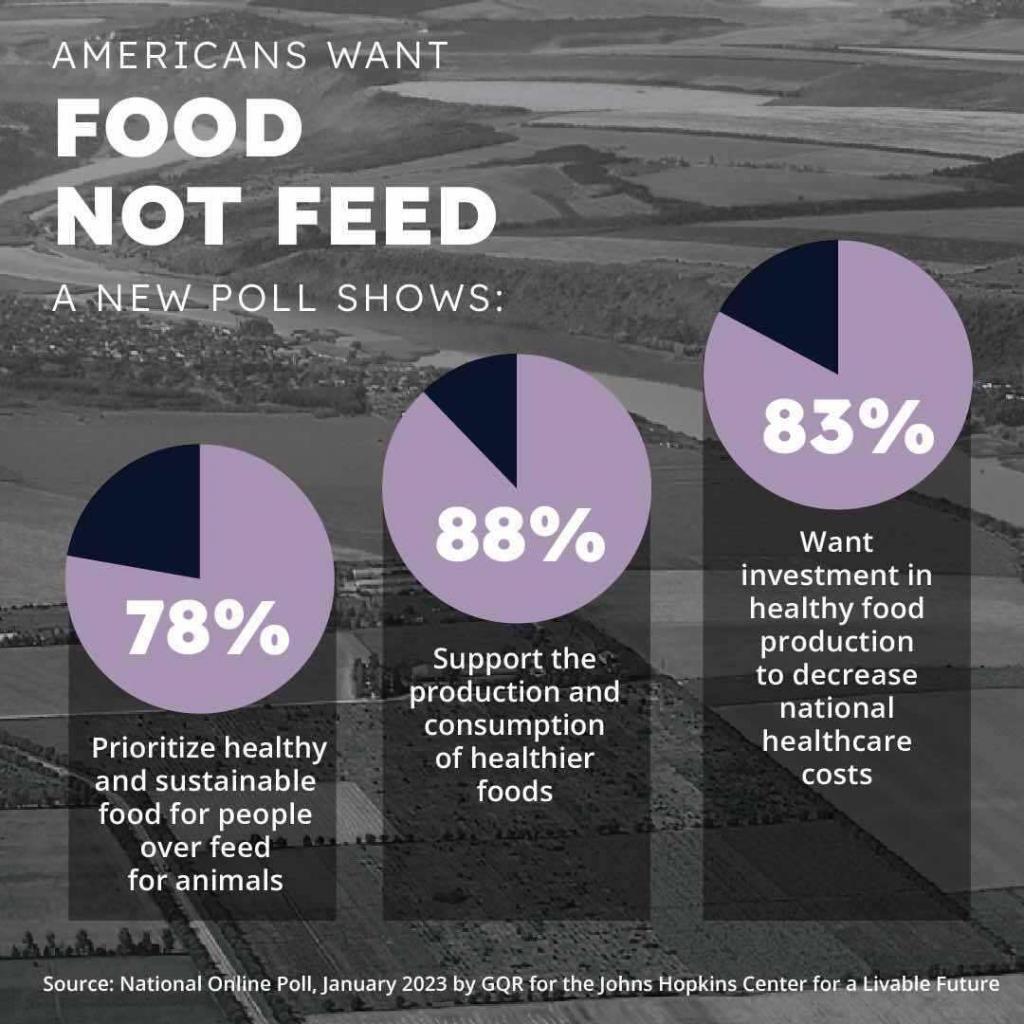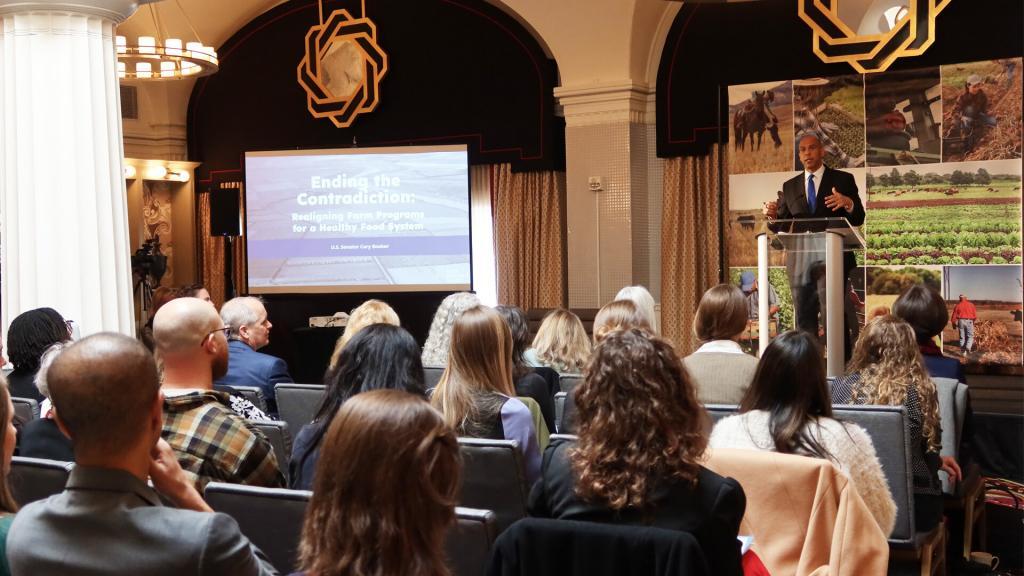We Want Food, Not Feed!
Our food system should work for everyone, not just a handful of multinational corporations — and voters agree. Recent polling on behalf of the Johns Hopkins Center for a Livable Future in collaboration with Farm Action shows overwhelming bipartisan support for shifting our federal farm funding to prioritize food for people over feed for corporate-controlled livestock.
Farm bill after farm bill has prioritized feeding industrial poultry and livestock all over the world over putting food on our neighbors’ tables — robbing farmers of opportunities and funneling profits toward global grain and meatpacking corporations. This doesn’t come as a surprise, as we’ve been responding to Big Ag’s playbook each farm bill cycle. It’s time for us to have our own playbook and make them respond to us through the Food Not Feed movement.

Food Not Feed Summit
The movement kicked off last week as Farm Action and a powerful coalition of farmers, ranchers, health, environmental, social justice, faith, labor, and animal advocates hosted the Food Not Feed Summit in Washington, D.C. to demonstrate the need and momentum to fundamentally change America’s agriculture policies.
It was an historic event where hundreds gathered with a shared goal of establishing an agenda to shift federal farm programs toward fiber-rich foods and regeneratively raised livestock and poultry within a system that’s fair and equitable from seed to fork.
Dispelling Big Ag’s Big Myths
First, our speakers busted the myths that Big Ag uses each farm bill cycle to maintain the status quo. Scott Faber of the Environmental Working Group addressed the myth that we need Big Ag to feed the world: “Do we really feed the world? The short answer is no…most of what we do grow is used for feed grains for animals, not food for people.” The truth is, we’re not even feeding ourselves. The U.S. has racked up a trade deficit due to our dependence on produce imports, and Americans are more vulnerable than ever to the whims of foreign governments and global trade.

Our next speaker, Dr. Zach Bush of Farmer’s Footprint, addressed the myths that industrial agriculture is climate-smart and safe for our health. We’ve depleted 97% of carbon from Earth’s soils by relying so heavily on farm inputs like synthetic fertilizer to grow crops on a massive scale, which has disrupted the soil’s microbiology and weakened plants’ immune systems. Big Ag’s solution is adding more inputs like pesticides and herbicides.
Bush continued, “the soils within our farming system ultimately are the foundation for which we build the soils within our gut. As we consumed more and more herbicides and pesticides through food and water, we denuded our own soils within our bodies and we’ve uncovered the great human pandemic of chronic disease.” We must understand that we can’t keep relying on the synthetic bandaids that got us into this crisis to get us out of it: “So here we find ourselves at a moment of collapse…it’s time to move to a holistic approach to understanding the vitality of life on earth.”
In his impassioned speech, U.S. Senator Cory Booker compared the Food Not Feed Summit to 19th-century suffrage gatherings: “This is a room that reminds me of gatherings like Seneca Falls,” referring to the first women’s rights convention in 1848. “We’re all part of a broken system that’s hurting everyone from farmers to farmworkers, from families and consumers,” he said. This system was not inevitable — it’s in place because of intentional policy choices, many of them made just in the past several decades. These policies can, and must, change.
The Senator outlined the policy changes necessary for realigning our farm programs to create a healthy food system and improve public health.
In Their Own Words: Farmers Feeding America
Next, Kara Shannon of ASPCA moderated a panel with farmers discussing how they’re breaking away from industrial agriculture’s grip and doing things differently. Panelist Tanner Faaborg of 1100 Farmstead and The Transfarmation Project described how “the tide has been shifting the wrong way in the last 30 years — everyone is growing commodity crops and putting up CAFOs. When everyone does it this way, getting out feels like a crazy idea, but change is possible.” Sherri Dugger of Socially Responsible Agriculture Project added that “we know most small farmers are exploited by this system.” She discussed the organization’s Contract Grower Transition Program, which supports contract growers hoping to exit the industry and provides resources to prevent others from becoming trapped in this system. Samantha Gasson from Bull City Farm and Food Animal Concerns Trust explained that we must expand the resources available to farmers trying to break away from industrial agriculture’s grip: “We should focus more on the testing that smaller farmers need — instead of just supporting factory farms, bring in the small farmers and give them the services they need.”
Lena Brook of NRDC moderated the next panel discussion among farmers who are successfully growing and raising food for their communities. These farmers shared what support would allow more farmers to live this story. Mike Callicrate of Ranch Foods Direct explained that “we need to facilitate a direct market between the farmer and consumer as much as possible, with as much of the consumer dollar flowing back to the farmer as possible.” Donna Pearson McClish of Common Ground Producers and Growers added that “food has to be a policy issue, not a profit issue…when we have healthy food, we have healthy families.”
Next on the panel, Phillip Barker from Operation Spring Plant explained that we need “more money going into programs to bring in the next generation of Black farmers,” and emphasized the importance of making sure Black farmers have the opportunity to be part of the 2023 Farm Bill discussions. Bryn Bird of Bird’s Haven Farms pointed out that “Americans haven’t seen the true cost of food…we hide it through these subsidies.” She added that “farmers don’t want a handout, we want a hand up — we need massive investments into regional food systems.”
Food Not Feed Policy in Action
Alison Grantham of Grow Well Consulting discussed farm sector economics and the path to profitability that would be opened if our policies supported farmers growing healthy food for their neighbors. “The policies we have in place have encouraged caloric productivity at all costs, and they skew our land allocation tremendously toward livestock feed instead of food, leading to the scourge of diet-related diseases we see today,” she explained.
Of the 320 million acres of harvested cropland in the U.S., nearly half of it is used just for growing corn and soybeans — and under 5% is used for growing specialty crops like fruits, vegetables, nuts, and legumes. We have plenty of space to shift specialty crop production so we don’t have to import half of them, but we must shift our farm support programs to make that change: “We can do big things with government spending, but the way we have been spending it isn’t to change the farm sector, it’s to uphold the status quo.”
Farm Action’s Joe Maxwell and Jake Davis of Local Root Strategies rounded out the Summit by explaining the policy changes and actions we need to shift to Food Not Feed. Joe asked everyone in the room and those online to kick off the Food Not Feed movement by calling their members of Congress and asking that they prioritize feeding people, not just industrial livestock and poultry in the 2023 Farm Bill.
To end the in-person experience of the Food Not Feed Summit, Kristen Grimm of Spitfire Strategies brought the participants in the room together to continue to create momentum and connect on a deeper level surrounding this work and the actions they can take going forward.
Advocacy on the Hill
The Summit’s in-person attendees then took our critical message to more than 100 members of Congress across the ideological spectrum — including Agriculture Committee staff in both chambers of Congress — as well as staff at the USDA, DOJ, and the White House to ensure that those responsible for creating and managing our farm support programs understand the importance of prioritizing food, not feed in the upcoming farm bill. Below is a glimpse at what this would look like. Check out Farm Action’s Fair Farm Bill campaign page to see our complete agenda for the 2023 and 2028 farm bills.
- A shift in government support from feed grains for industrial livestock production toward vegetables, fruits, nuts, legumes, mushrooms, and cereal grains, allowing farmers more choices to profitably grow food for their communities.
- Increased financial and technical resources for farmers transitioning away from industrial agriculture and toward conservation and regenerative practices, including moving livestock and poultry out of Concentrated Animal Feeding Operations and back onto the land. Over time, a more environmentally-friendly agriculture system would be more resilient and less costly for taxpayers.
- Requirements in the Farm Bill for farmers to implement certain conservation practices in order to participate in federal crop insurance, commodity/price support, and disaster payment programs.
Getting Results
Two days after the Summit, Senate Agriculture Committee Chairwoman Debbie Stabenow announced that she will focus on expanding crop insurance options beyond feed grains — toward fruits, vegetables, and more — during the upcoming farm bill debate. The following Tuesday, House Speaker Kevin McCarthy emphasized the importance of the farm bill to fruit, vegetables, and nut crops. He added, “if we are not growing food in America, then we become more dependent on China, Mexico, and other nations for our food.” Rounding out the post-Summit week, the Government Accountability Office recommended tying conservation practices to crop insurance or commodity payments, another one of our direct asks.

Keep The Momentum Going
- Call your members of Congress: Visit whoismyrepresentative.com and call your representative and senators today. Here is a script to guide you:
I am (your name). I am joining the Food Not Feed movement along with hundreds of other folks from around the country.
We are all calling our members of Congress because we know that over the next several months they will be debating and drafting the next farm bill where our country’s food and agriculture policies are developed.
I am asking that in every conversation and in every vote you prioritize feeding the people and not just growing feed for industrial livestock and poultry.
Please create a Farm Bill that supports Food Not Feed. Thank you.
- Not a fan of phone calls? Send our Farm Bill Handbook to your elected officials instead!
- Keep the buzz going on social media: Share why you are for Food Not Feed and what it means to your livelihood and your community. Use the #FoodNotFeed hashtag to join the conversation.
Missed the Summit? Check out the replay below.
Written and edited by: Jessica Cusworth, Dee Laninga, and Angela Huffman

